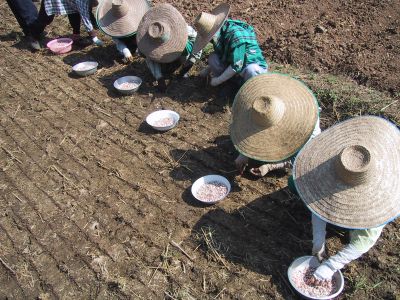Contemporary rural politics is driven by a middle-income peasantry with a thoroughly modern political logic. Their strategy is to engage with sources of power, not to oppose them.
Half a century ago, 96 per cent of Thailand’s rural dwellers lived in poverty. As a result of rapid economic growth and diversification, this has now plummeted to 12 per cent. In Thailand’s modern rural economy, fear of outright subsistence failure is no longer a core driver of political activity, and this has enabled the country’s middle-income peasantry to pursue new political agendas. Livelihoods in the rural north and northeast have certainly improved, but levels of income and rates of growth lag well behind those found in central Thailand, Bangkok and parts of the southern Thailand.
One important reason for this inequality is that Thailand has maintained a relatively large agricultural workforce that is much less productive than its industrial workforce. Though there has been productivity growth in the agricultural sector, productivity in industry has increased much more rapidly, and from a much higher base. A worker in industry contributes 8.5 times as much to GDP as a worker in agriculture. Non-agricultural employment has helped to increase the incomes of peasant households, but due to the low level of rural enterprise, jobs are most often available in the less productive parts of the non-farm economy.
Thailand’s governments have been only too aware of this economic disparity and the political hazards of rural disadvantage. For the past half century, attempts to promote rural development have been the central feature of the relationship between the Thai state and the peasantry. In simple terms, the Thai government — like governments in many other developing countries — has moved from taxing the rural economy to subsidising it.
The origins of Thailand’s recent political tension lie in the dilemmas of this transformed fiscal relationship. State investment, combined with wide-ranging support for the tenure of smallholders, has enhanced agricultural incomes and created numerous sources of non-farm employment in the construction sector, local development projects and government agencies. The overall impact of this state support for rural Thailand has been to help develop and maintain a middle-income peasantry rather than fundamentally transform it. The government’s performance on agricultural productivity has been lacklustre by regional standards, and, more importantly, it has had limited success in developing non-farm rural enterprise.
The government’s massive investment in the rural economy has helped to maintain a large rural population that, despite significant livelihood improvements, is insufficiently productive to fully meet the aspirations that economic growth has aroused. There is a strong political expectation that the state will improve its efforts to enhance rural livelihoods, reduce inequality and provide a secure backup when experimental engagements with private capital fail. Rural political society in Thailand is not driven by a peasantry that is staging a rear-guard action against dissolution but by a peasantry that is assertively negotiating the terms of its persistence.
Thaksin Shinawatra cleverly capitalised on the dilemmas that have emerged in Thailand’s modernisation. His unprecedented political success owes much to the fact that he shaped his policies around rural aspirations for productive connections with sources of power. Shinawatra’s policies recognised that the most important challenges for Thai peasants were to diversify their livelihoods, increase productivity, limit exposure to debt and maintain the flow of government support for the rural economy. There was nothing particularly new about Thaksin’s emphasis on rural modernisation, but he packaged it in a way that was attractive to an economically sophisticated electorate: rural households can turn their assets into capital, villagers can manage agricultural credit, farmers can implement infrastructure projects, and local hospitals can provide universal health coverage.
Rural political society’s defence of its relationship with the state has been an important factor energising the violent confrontations on the streets of Bangkok and the strong support shown for Yingluck Shinawatra in the election of July 2011. Rural people are rejecting a system in which their votes can be overruled when they elect governments that are unpalatable to Thailand’s political elite. Elections have become an important mechanism through which people evaluate and domesticate the power of political leaders. Some commentators complained that the pro-Thaksin red-shirt protesters had no clear policy agenda, and others sought to discredit the red-shirt protests by pointing to vastly improved standards of living in rural areas. These are outdated assessments based on old-fashioned stereotypes of peasant protest.
For Thailand’s middle-income peasantry, specific policies are less important than a secure relationship with the state. Thaksin’s specific policy initiatives were certainly important in galvanising rural support, but even more important was the strong sense that electoral force had shifted the nation’s most important power bargains away from Bangkok and toward the rural electorates of northern and northeastern Thailand.
Thailand’s rural society has fundamentally changed. An assertive middle-income peasantry has emerged as a key player in the political landscape. The Thaksin forces have recognised this and they will dominate Thai politics until their rivals can come to grips with the realities of the modern rural economy.
Andrew Walker is a Senior Fellow at the Department of Political and Social Change, School of International, Political and Social Studies, ANU.
He is the author of Thailand’s Political Peasants: Power in the Modern Rural Economy, University of Wisconsin Press, 2012.

